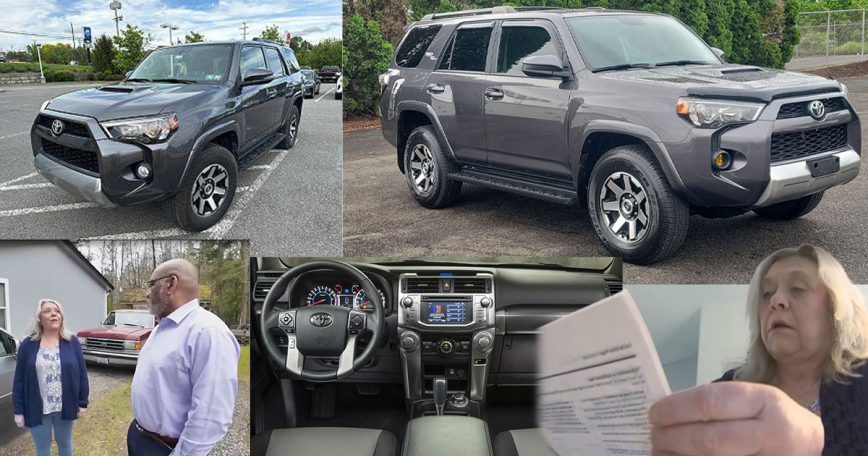New Rampant VIN# Cloning Scheme On FB Market Place

In recent years, the sophisticated scam known as VIN cloning has emerged as a significant threat to car buyers, leaving many unsuspecting victims out thousands of dollars. VIN cloning involves fraudsters stealing the vehicle identification number (VIN) from a legitimate car and placing it on a stolen one, creating a facade of legitimacy. This article explores two cases where individuals fell victim to this scam, highlighting the details of their experiences and the broader implications of VIN cloning.
Maril Bauter’s Retirement Ride Nightmare
Maril Bauter, a retiree from Washington, experienced firsthand the devastating impact of VIN cloning. She had planned to enjoy her retirement with a 2019 Toyota 4Runner, which she found on Facebook Marketplace. The SUV appeared perfect: clean, with no accidents and all documents matched up when she cross-checked the VIN and Carfax report.
kiro.newsapp://deeplink/video?videoUrl=378bc21c-7100-4f12-b717-f57d81bb5a95
However, her dream turned into a nightmare when she tried to renew her vehicle’s registration. The Washington State Patrol discovered thieves had stolen the 4Runner from a Vancouver, Washington dealership. The VIN had been cloned from another vehicle of the same make and model in Portland. Lt. Jason Hicks, who investigates cloned VIN cases, emphasized the sophistication of the scam, stating, “Whoever did this went above and beyond what’s normally done in these situations to obtain that fraudulent title.”
The Blaine licensing agency didn’t detect the fraudulent title when Maril registered her vehicle due to the scam’s sophistication. This oversight was later acknowledged by Christine Anthony from the Department of Licensing, who admitted, “The system didn’t work like it was supposed to.”
Maril’s car was seized, leaving her shocked and without the vehicle she had invested so much in. Her insurance company initially refused her claim, stating she had no coverage for a stolen car.
Farmers Insurance agreed to pay her claim after media intervention, highlighting investigative journalism’s crucial role in advocating for victims.
Dan Iero’s Costly Lesson
Similarly, Dan Iero, a resident of South Philadelphia, fell victim to VIN cloning when he unknowingly purchased a stolen vehicle. Dan, who runs a peer-to-peer rental company, sought to expand his fleet with a larger SUV. He found what seemed like a perfect deal on Facebook Marketplace, but it turned out to be part of a sophisticated VIN cloning scheme.
Dan’s experience underscores the complexities and risks associated with buying vehicles through online platforms. The thieves had transferred a legitimate VIN from another vehicle to the stolen SUV, making it appear authentic. This scam cost Dan thousands of dollars and significant stress as he navigated the aftermath of his purchase.
Understanding VIN Cloning
VIN cloning scams are becoming increasingly prevalent, primarily due to the growing sophistication of the criminals involved. These scams involve several critical steps:
- Stealing a VIN: Scammers first identify a legitimate vehicle and steal its VIN. They often find these VINs on cars parked in public places or listed in online sales ads.
- Transferring the VIN: Scammers place the stolen VIN on a similar stolen vehicle, making it appear legitimate.
- Creating Fraudulent Documents: Scammers forge vehicle documents, including titles and registration papers, to match the stolen VIN. This makes the cloned vehicle seem authentic to unsuspecting buyers.
- Selling the Cloned Vehicle: The vehicle is then sold to an unsuspecting buyer, who believes they are purchasing a legitimate car. The scammer usually insists on a quick cash deal to avoid detection.
Protecting Yourself from VIN Cloning
To avoid falling victim to VIN cloning, car buyers should take several precautionary steps:
- Check Multiple Sources: Verify the VIN with multiple sources, including Carfax and the National Motor Vehicle Title Information System (NMVTIS). Ensure all details, such as the year, make, and model, match up.
- Get a Professional Inspection: Have a trusted mechanic inspect the vehicle before purchase. They can check for signs of tampering, such as mismatched VIN plates.
- Verify the Seller: Conduct a thorough background check on the seller. Be wary of sellers who refuse to meet in person or insist on cash-only transactions.
- Look for Multiple VIN Locations: Vehicles typically have VINs in several locations. Make sure all VINs on the vehicle match the one provided in the documents.
- Use Trusted Platforms: When buying a car online, use reputable platforms that offer buyer protection services and thorough vetting of sellers.
Legislative and Regulatory Measures
Government agencies and law enforcement are increasingly aware of VIN cloning scams and are taking measures to combat them. For instance, the Department of Licensing in Washington State has revised its processes to ensure more rigorous checks are in place when transferring vehicle titles from other states.
Furthermore, the National Highway Traffic Safety Administration (NHTSA) is working on enhancing its database systems to detect anomalies in vehicle registrations. Improved coordination between state and federal agencies is also crucial in tracking and preventing these scams.
VIN cloning scams highlight the vulnerabilities in the vehicle purchasing process and the need for increased vigilance from buyers and regulatory bodies. Both Maril Bauter’s and Dan Iero’s experiences serve as cautionary tales, emphasizing the importance of thorough verification and professional inspections when buying vehicles.
As scams become more sophisticated, car buyers must stay informed and cautious. By taking proactive steps and utilizing available resources, buyers can protect themselves from becoming victims of VIN cloning. Additionally, continued improvements in regulatory practices and increased awareness can help reduce the incidence of these fraudulent schemes, ensuring a safer marketplace for everyone. Source Cox Media Group.

